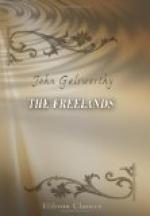The little thing who had her troubles before her, sitting in her bedroom window, had watched his white front and the glowing point of his cigar passing down there in the dark, and, though she did not know that they belonged to him, had thought: ’There’s some one nice, anyway, who likes being out instead of in that stuffy drawing-room, playing bridge, and talking, talking.’ Then she felt ashamed of her uncharitableness. After all, it was wrong to think of them like that. They did it for rest after all their hard work; and she—she did not work at all! If only Aunt Kirsteen would let her stay at Joyfields, and teach her all that Sheila knew! And lighting her candles, she opened her diary to write.
“Life,” she wrote, “is like looking at the night. One never knows what’s coming, only suspects, as in the darkness you suspect which trees are what, and try to see whether you are coming to the edge of anything. . . . A moth has just flown into my candle before I could stop it! Has it gone quite out of the world? If so, why should it be different for us? The same great Something makes all life and death, all light and dark, all love and hate—then why one fate for one living thing, and the opposite for another? But suppose there is nothing after death—would it make me say: ’I’d rather not live’? It would only make me delight more in life of every kind. Only human beings brood and are discontented, and trouble about future life. While Derek and I were sitting in that field this morning, a bumblebee flew to the bank and tucked its head into the grass and went to sleep, just tired out with flying and working at its flowers; it simply snoozed its head down and went off. We ought to live every minute to the utmost, and when we’re tired out, tuck




